A substantial penstemon with spikes of white to pale pink flowers in June. Unlike most penstemons, it prefers slightly moist, well-drained soil in full sun or part shade. Firewise.
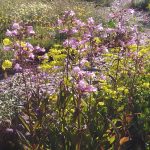
- Foxglove Penstemon
- 3
- Sun/Part shade
- 3’ x 2
- Central/Eastern US


A substantial penstemon with spikes of white to pale pink flowers in June. Unlike most penstemons, it prefers slightly moist, well-drained soil in full sun or part shade. Firewise.
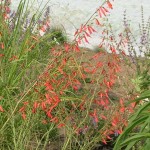
Firecracker Penstemon bears tubular, bright scarlet flowers over dark green basal leaves. Prefers poor to moderately fertile, well drained soil and full sun. Great for dry desert-scapes. Pollinators: hummingbirds and bees. Firewise.
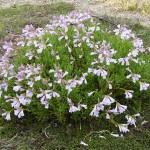
Shrubby Penstemon is an unusual woody, upright, evergreen penstemon with abundant lavender tubular flowers in early summer. Foliage turns soft yellow in autumn with purple-green flower spikelets. Leaves may burn in winter–shade helps. Firewise.
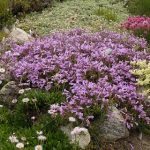
Dwarf Shrubby Penstemon is a compact version of the native Shrubby Penstemon and quite similar to Davidson’s Penstemon. Gorgeous lavender flowers in late spring. Evergreen mounds are beautiful in winter. Charming! Firewise.
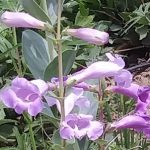
One of the showiest of all North American native Penstemons, Penstemon grandiflorus can reach heights of three feet with stunning pink to purple flowers. The plant’s beautiful vertical structure and succulent gray-green foliage, make it a very unique Penstemon. Firewise. More information here.
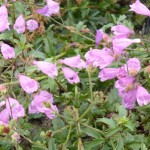
Richardson’s is a wonderful and easy Penstemon for filling in spaces in the garden or tumbling down banks on trailing stems. Unlike most penstemons, this one starts blooming late, producing a charming profusion of rosy purple flowers that lasts from early summer nearly until frost. It re-seeds readily and multiplies in the garden. Firewise.
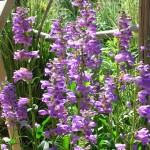
Rocky Mountain Penstemon has violet-blue flower spikes over leathery foliage. Attracts hummingbirds. Long-lived, reliable bloomer. Forms low evergreen clumps, easy and reliable; deadhead for re-bloom. Pollinators: bees. Firewise.
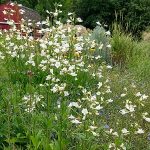
Pure white flowers on tall stems in early summer. This clump-forming penstemon grows wild on dryish soils in prairies and open woods. Attractive to hummingbirds, butterflies and bees.
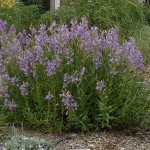
Lovely Penstemon is a vigorous evergreen native penstemon with large, gorgeous tubular lavender flowers in late spring. Cut back seed heads to encourage re-bloom. Pollinators: bees. Firewise.
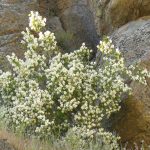
Syringa or Mock Orange is a deciduous shrub with lovely four petaled flowers, incredible fragrance. In the wild, Syringa grows in variety of habitats, from streambanks to lava flows. Can adjust to very low water sites. Idaho state flower. Firewise. More information here.
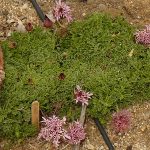
Charming, low-growing rock garden plant or small-scale groundcover. Finely cut evergreen foliage creeps across the ground, sprouting pincushion-like mauve flowers in late spring. Attractive seedhead tufts follow.
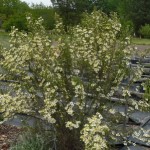
A stout, upright shrub or subtree growing to head-high or higher. Produces many pale yellow, wildrose-type flowers in the spring, each of which produces five feathery plumes with a seed attached. Related to bitterbrush.
Woods Rose has fragrant, pink rose flowers which profusely bloom. A freely suckering native. Can bloom in full shade as well as full sun.
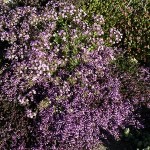
Rock Soapwort is a vigorous, mounding plant, covered with small pink flowers in the spring. Beautiful for edging a sunny border or spilling over rock walls or the edges of large planters. To maintain a compact habit, prune plants back hard immediately after blooming. Firewise.
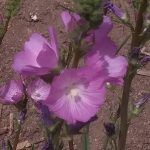
This native Checkermallow is a charming wildflower sporting dozens of small hollyhock-like blooms. Found in the wild in moist meadows, but it does well in moderately irrigated gardens. Supports native pollinators.
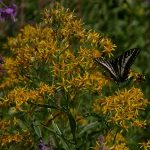
This widespread native is an excellent pollinator plant, as well as being extremely drought tolerant once established. Its only drawback is that it spreads by root and can be quite aggressive in a well-watered garden.
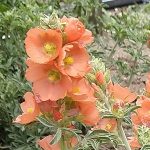
This low-growing Globemallow travels by root and colonizes very dry areas with poor soil. Tolerates clay. Flower color can vary from orange to red. More information here.
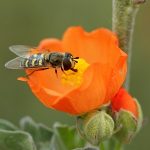
Gooseberry Globemallow’s red-orange flowers bloom in spring & summer. Attracts all kinds of native pollinators.
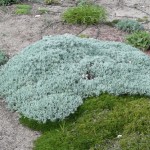
Partridge Feather is a low-growing, no-care tough, grey-green groundcover with lovely feather-shaped leaves. Good for sun or part shade, little water. Evergreen.
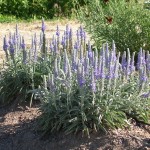
Silver Speedwell has deep purple/blue flowers in early summer on 10” flower spikes over attractive gray-green foliage. The evergreen foliage serves as a small-scale groundcover.
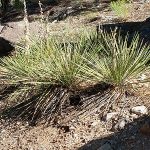
Slow-growing, evergreen. Great foundation plant for the xeric garden. Needs no water once established. Do not confuse with the locally common Yucca filamentosa. Firewise and evergreen.